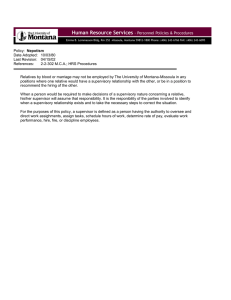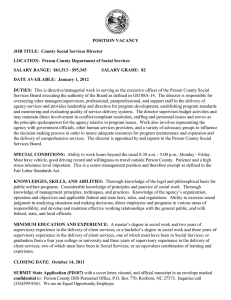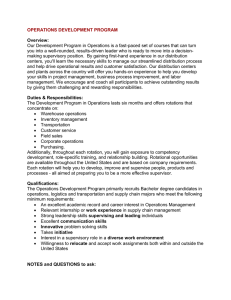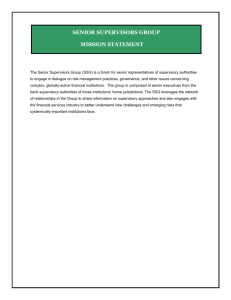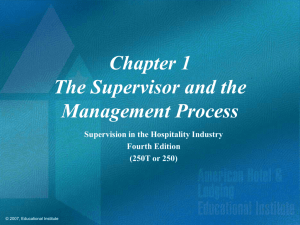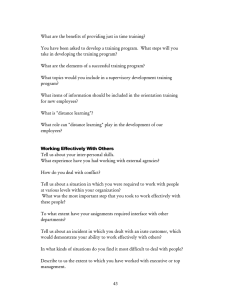College of San Mateo Official Course Outline COURSE ID: Semester Units/Hours:
advertisement
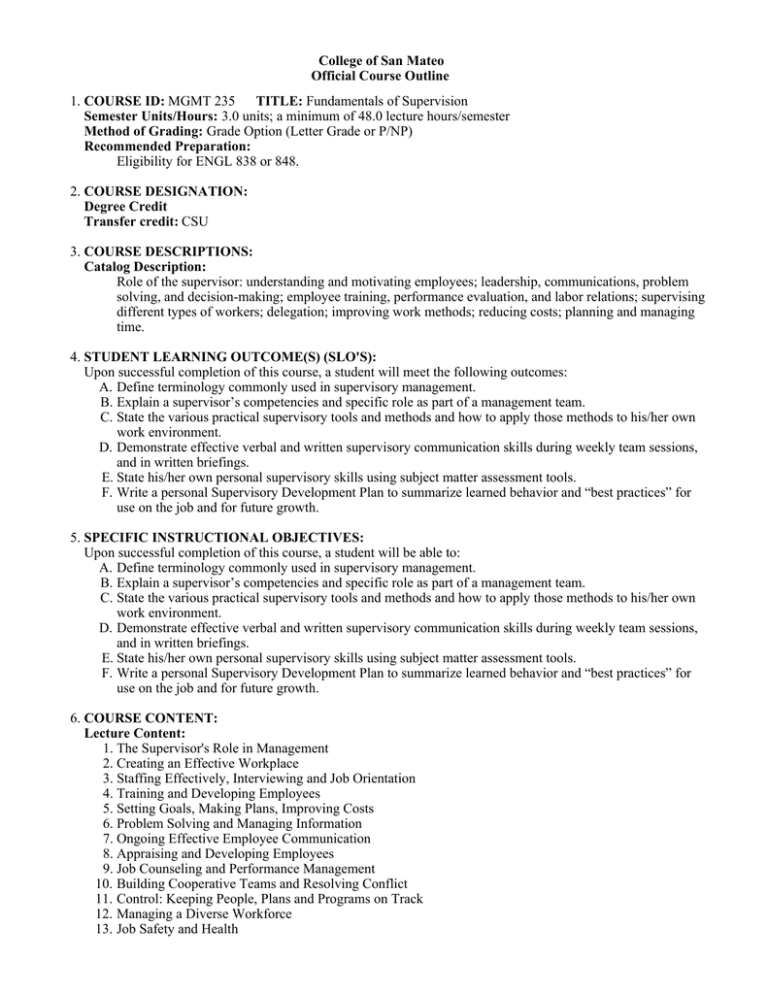
College of San Mateo Official Course Outline 1. COURSE ID: MGMT 235 TITLE: Fundamentals of Supervision Semester Units/Hours: 3.0 units; a minimum of 48.0 lecture hours/semester Method of Grading: Grade Option (Letter Grade or P/NP) Recommended Preparation: Eligibility for ENGL 838 or 848. 2. COURSE DESIGNATION: Degree Credit Transfer credit: CSU 3. COURSE DESCRIPTIONS: Catalog Description: Role of the supervisor: understanding and motivating employees; leadership, communications, problem solving, and decision-making; employee training, performance evaluation, and labor relations; supervising different types of workers; delegation; improving work methods; reducing costs; planning and managing time. 4. STUDENT LEARNING OUTCOME(S) (SLO'S): Upon successful completion of this course, a student will meet the following outcomes: A. Define terminology commonly used in supervisory management. B. Explain a supervisor’s competencies and specific role as part of a management team. C. State the various practical supervisory tools and methods and how to apply those methods to his/her own work environment. D. Demonstrate effective verbal and written supervisory communication skills during weekly team sessions, and in written briefings. E. State his/her own personal supervisory skills using subject matter assessment tools. F. Write a personal Supervisory Development Plan to summarize learned behavior and “best practices” for use on the job and for future growth. 5. SPECIFIC INSTRUCTIONAL OBJECTIVES: Upon successful completion of this course, a student will be able to: A. Define terminology commonly used in supervisory management. B. Explain a supervisor’s competencies and specific role as part of a management team. C. State the various practical supervisory tools and methods and how to apply those methods to his/her own work environment. D. Demonstrate effective verbal and written supervisory communication skills during weekly team sessions, and in written briefings. E. State his/her own personal supervisory skills using subject matter assessment tools. F. Write a personal Supervisory Development Plan to summarize learned behavior and “best practices” for use on the job and for future growth. 6. COURSE CONTENT: Lecture Content: 1. The Supervisor's Role in Management 2. Creating an Effective Workplace 3. Staffing Effectively, Interviewing and Job Orientation 4. Training and Developing Employees 5. Setting Goals, Making Plans, Improving Costs 6. Problem Solving and Managing Information 7. Ongoing Effective Employee Communication 8. Appraising and Developing Employees 9. Job Counseling and Performance Management 10. Building Cooperative Teams and Resolving Conflict 11. Control: Keeping People, Plans and Programs on Track 12. Managing a Diverse Workforce 13. Job Safety and Health 14. Collective Bargaining and Labor Unions 14. Collective Bargaining and Labor Unions 7. REPRESENTATIVE METHODS OF INSTRUCTION: Typical methods of instruction may include: A. Lecture B. Directed Study C. Discussion D. Other (Specify): • Use of Management Case Studies with in class discussion or written analysis. • Review of subject matter videos, with team problem solving and discussions. 8. REPRESENTATIVE ASSIGNMENTS Representative assignments in this course may include, but are not limited to the following: Writing Assignments: Use of management case studies with written analysis. Write a personal Supervisory Development Plan. Reading Assignments: Weekly student required reading of textbook or supplemental materials. 9. REPRESENTATIVE METHODS OF EVALUATION Representative methods of evaluation may include: A. Class Participation B. Class Work C. Exams/Tests D. Group Projects E. Home Work F. Oral Presentation G. Papers H. Quizzes I. Research Projects 10. REPRESENTATIVE TEXT(S): Possible textbooks include: A. John Newstrom. Supervision: Managing for Results, latest ed. Mcgraw Hill, 2012 Other: A. or equivalent per intructor Origination Date: November 2010 Curriculum Committee Approval Date: April 2013 Effective Term: Fall 2013 Course Originator: Anne Figone
